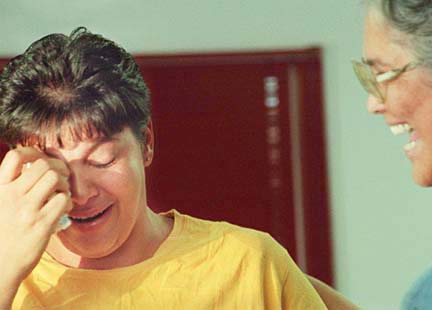Advertisement - Click to support our sponsors.


Waianae woman
wins $100,000 treating
addiction with manaRead the original articles
By Mary Adamski
and Leila Fujimori
Star-BulletinA Waianae woman has won a $100,000 award for successfully combining Hawaiian cultural values and practices with modern medical standards in treating people battling cancer and addictions.
Ho'oipo DeCambra, director of Ho'omau Ke Ola drug treatment program, was one of 10 national winners from a field of 387 nominees for the Community Health Leadership Program award. The awards will be presented June 14 in Washington, D.C., by the Robert Wood Johnson Foundation, the largest private philanthropy dedicated to improving health care for Americans.
"My staff has it all spent already at the treatment facility," DeCambra said with a laugh. She said the Waianae addiction and abuse program gets $388,000 a year for its residential treatment program: "That is what the state gives us, it costs more."
Ho'omau Ke Ola is a success, she said, because "we are using the best of all possibilities, the very latest clinical practices, absolutely, and our Hawaiian-value-based program. That makes us quite unique. We've evolved to be what we are to be in Waianae.
October 8-9, 1998 articles
on ice addiction and the
DeCambrasDay 1: Downward spiral
"The work is very tense, very hard work and we have had a lot of stability in our staffing," the director said. "We have been like a training ground for community people. They not only come for treatment, we supervise and train them, help them to make plans for careers. We have people who totally turn their lives around."
An example of mixing the cultural with the clinical is the Hawaiian tradition of hooponopono, said Pearl Gomes, special projects coordinator at Ho'omau Ke Ola. "If there is a problem, the family is called together. They identify the problem and everybody gets a chance to say how it affected them. There is forgiveness, restitution, whatever will make it right. Everybody who goes through the program will go through hooponopono ... to make things right before we can move on."
DeCambra has a long history as an advocate of health concerns on the Waianae coast. She worked with the Cancer Research Institute on a study begun 10 years ago on the high rate of breast cancer deaths among Hawaiian women. It led to creation of the Women's Health Network, providing support and education on health issues.
As a former chairman of the board of Waianae Coast Comprehensive Health Center, she helped introduce physical, mental and spiritual aspects of Hawaiian healing practices. She is still on the board of Hawaii Health Foundation and serves on an ad hoc committee of the U.S. Department of Health and Human Services, Office of Women's Health, Minority Women's Health Panel of Experts.
"I didn't have to think who to nominate," said Dr. Carol Murry of Ke Ola O Hawaii, a partnership between the University of Hawaii and community health centers. "Ho'oipo serves as an effective bridge and translator between cultures ... whether it's substance users, community members, health care providers, (university) deans or policy makers. She's a storyteller and poet who communicates in ways that enables transformation as well as information transfers."
Murry said DeCambra's style was reflected in her success in involving women in the cancer research project. "She had a vision that was not there before. She saw that the women in Waianae needed to be in control of the program, to be decision-makers, that they needed to understand the data, not just have somebody come and be active subjects. She designed the program so it would be really effective for the women there, integrating Hawaiian values and practices.
"Mana refers to the power of a person's spirit. Her mana is the overriding reason why we can think of no better person to fulfill the vision of this award," Murry said.
The DeCambra family doesn't have to wait until June 14 to celebrate a triumph. At a Friday ceremony at Waianae Coast Community Health Center, Ho'oipo's daughter Rhonda will graduate from a Kapiolani Community College medical assistant training program. Two years ago, Rhonda and her partner Bennett Villanueva, parents of four small children, detailed their struggle for rehabilitation from addiction to crystal methamphetamine in a Honolulu Star-Bulletin series.
"I'm very proud of her," said Ho'oipo DeCambra. "She continues to do those things to shape her life. I'm happy for my grandkids.
"People who have an addiction will either end up in prison or a mental institution and sometimes they die. When they make it, I believe the whole community should celebrate."